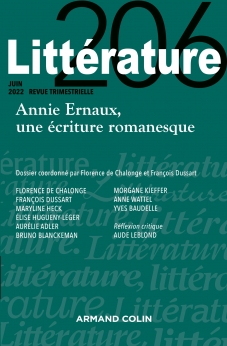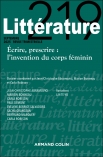
LITTÉRATURE Nº206 (2/2022)
Pour acheter ce numéro, contactez-nous
Recevez les numéros de l'année en cours et accédez à l'intégralité des articles en ligne.
Lorsqu’Annie Ernaux exprime sa méfiance vis-à-vis du romanesque, c’est un principe de déformation du réel au profit du sensationnel qu’elle refuse. Son écriture est pourtant nourrie de tout un répertoire proprement romanesque, qui fonctionne comme un vecteur de reconnaissance : les topoi romanesques offrent un recours pour la figuration du vécu, quoique jamais sans caution critique ou réflexive. Au principe du projet « ethnotextuel » d’Annie Ernaux, et aux côtés des apports de la sociologie, une dialectique du masque : le romanesque prend in fine valeur de révélateur, non de l’inédit, mais de ce qui derrière le récit biographique singulier fonde la partageabilité de l’expérience humaine.
When Annie Ernaux voices her mistrust vis-à-vis the romantic, it is a principle of deformation of the real in favour of the sensational which she refuses. Her writing is nevertheles nurtured on a properly romantic repertoire functioning as a vector of recognition : the romantic topoï show the way to the figuration of the living experience, however never without a critical or reflexive support. At the core of Annie Ernaux’s « ethnotextual » project, moreover with the contribution of sociology, lies a dialectic of the mask : the romantic eventually assumes the value of a revelation, not of the original, but of what, behind the singular autobiographical narrative, establishes the human experience as what can be shared by all.

